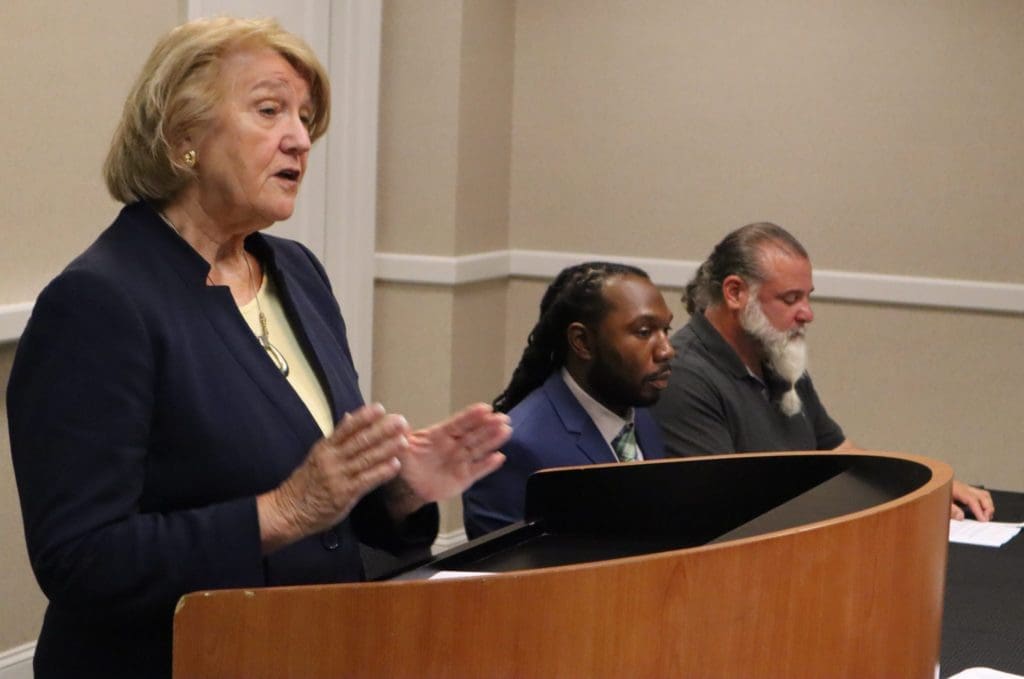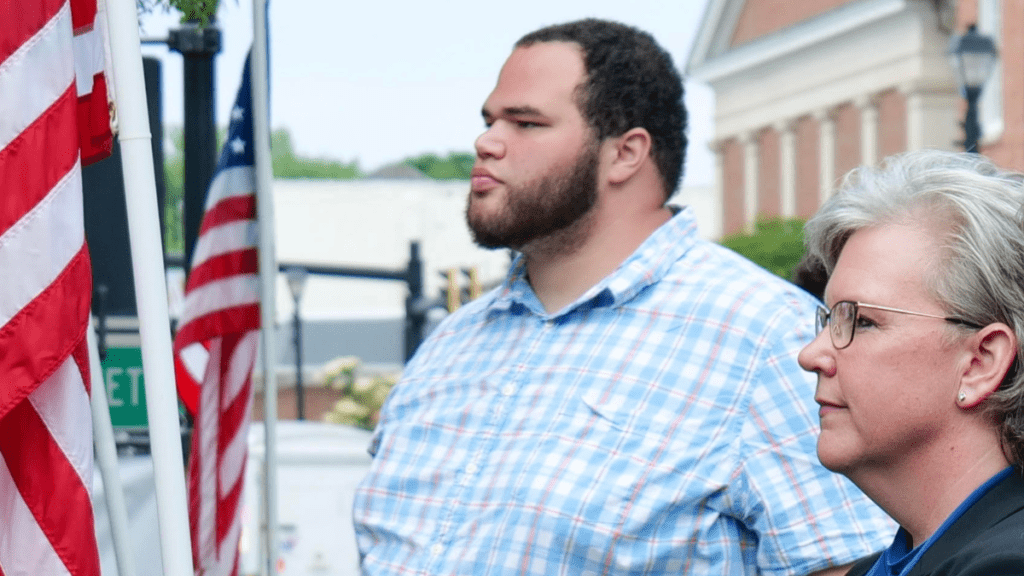

Charlie Megginson/Delaware LIVE News
Republicans were quick to say “we told you so” Thursday as word spread that a Chancery Court judge had ruled that Delaware’s new vote-by-mail law violates the state Constitution.
Democrats were quick to say the ruling – all but guaranteed to be appealed to the Delaware Supreme Court – will disenfranchise voters, especially low-income voters and people of color.


Vice Chancellor Nathan A. Cook, Delaware Court of Chancery
Vice Chancellor Nathan Cook, in fact, did not find the concept of mail-in voting unconstitutional.
He ruled that the way it became law put it at odds with the state Constitution and that it cannot be used in November’s general election.
In an 87-page, beautifully written opinion, Cook relied on legal precedent: A 1972 Supreme Court advisory opinion that said it is “beyond the power of the Legislature” to limit or expand the Constitution’s list of reasons an elector can cast an absentee ballot.
“Thus, if I were writing on a blank slate, I would likely conclude that the Vote-by-Mail Statute is not prohibited by the Delaware Constitution,” Cook wrote.
But the Supreme Court’s advisory opinion also cited case law from 1939 and 1942, and, so, Cook said, “I am not writing on a blank slate.”
It’s not for him to revisit those cases, he said. That’s a matter for the Supreme Court.
GOP gleeful, Dems frustrated


Republican Party chairwoman M. Jane Brady, left, announces the lawsuit on behalf of Michael Higgin and Michael Mennella, right. (Charlie Megginson/Delaware LIVE)
Republican Jane Brady, one of the attorneys behind the lawsuit, said Cook was “right on the law.”
“I think that he did a good job of going through the legislative and case law history,” she told Delaware LIVE News Wednesday.
On Friday, state House Republican leaders issued a joint statement saying the ruling reflected their arguments during hearings on the vote-by-mail bill.
“This week’s ruling only confirms what our legal team had been advising all along,” said House Minority Leader Danny Short, R-Seaford. “To allow for vote-by-mail in Delaware, the legislature would have to amend the state constitution.”
The only way to do that is to pass legislation by a two-thirds majority vote in both legislative chambers in two consecutive General Assemblies. While Democrats have had a supermajority in the Senate, allowing them to do that, they did not in the House, where Republicans could block such votes.
Gov. John Carney, a Democrat, expressed understanding of Cook’s decision.
“We are disappointed in the outcome on the vote-by-mail law, but we appreciate the Vice Chancellor’s discussion of his limited role,” said Emily David Hershman, the governor’s director of communications.
After news of the opinion became public, some pointed to comments from lawmakers suggesting they knew the law could be unconstitutional while it was being debated.
“I don’t know whether it’s constitutional or not constitutional, and neither do you guys or anybody else in here,” said Speaker of the House Pete Schwartzkopf during the bill’s House hearing. “The best way to get this thing done is hear this bill, move forward, and let a challenge go to the courts and let them decide it.”


Republican AG candidate Julianne Murray (right) alongside plaintiff Nick Miles. (Nick Miles)
Julianne Murray, an attorney who brought the accompanying lawsuit, noted Wednesday night, “Well, now it has been sorted out.”
Murray, who called Schwartzkopf’s comments cavalier, pointed out that bill sponsor Sen. Kyle Evans Gay took a more measured approach.
“Should the Supreme Court determine at some point related to this bill … that we have exceeded our powers, the Supreme Court will tell us so,” Gay said during the bill’s Senate hearing. “Having clarity on that issue is positive for this body [and] for the voters of Delaware.”
In an interview with Delaware LIVE News Wednesday, Gay said she believed then and believes now that the law is constitutional.


Sen. Kyle Evans Gay, D-Ardens
“My understanding and my plain reading of the Constitution is that Article V … permits the General Assembly to regulate the means and manner of voting,” Gay said. “Rep. Schwartzkopf is not an attorney, and I’m not surprised that he wouldn’t want to render a legal opinion.”
A lawyer, Gay specializes in litigation and government law, including constitutional law.
Gay said “legal minds can differ” about whether the precedent Cook cited is applicable to the mail-in-voting law.
The leaders of the Senate Democratic Caucus, however, did not seem to share the “legal minds can differ” opinion when they issued a statement Wednesday attacking the lawsuit as a “Republican-led effort to make voting as inconvenient as possible.”
“There now exists a very real possibility that Delawareans could be denied the right to vote by mail in November,” said the statement from Senate President Pro Tempore Dave Sokola, Majority Leader Bryan Townsend and Majority Whip Elizabeth Lockman.
“As the Department of Elections and Department of Justice now consider their legal options, it has never been clearer that only one party is fighting to expand ballot access for all voters,” they said.
Brady, a former Delaware attorney general and chair of the state Republican Party, didn’t take kindly to the Senate’s statement.
“To suggest that this was a political decision is an insult to one of the finest courts in the country, well respected for its independent review in all matters of business and equity,” Brady said.
Murray, who is the Republican candidate for attorney general, said she wasn’t motivated by partisan politics in filing the suit, either.
“For me, this has always been about the Delaware Constitution,” Murray said. “I don’t even have a problem with vote-by-mail, but we have a process, and our Constitution is specific about the excuses that are necessary. If you want to make it ‘no excuses,’ fine, but amend the Constitution to do that.”
Without somebody to check the General Assembly when they pass constitutionally dubious laws, what we’re left with is a “bad precedent” wherein the legislature is “completely unchecked,” Murray said.
While Cook kicked the voting-by-mail issue to the Supreme Court, he found the same-day registration law to be constitutional.
Brady said she doesn’t plan to appeal that part of Cook’s ruling.
“I think what I’ll try and do is find a political resolution through legislation,” she said. “I’d like to see us have legislation that provides for those ballots to be provisional. I don’t feel comfortable asking the court on an expedited appeal … to decide that matter.”
Carney praised that portion of Cook’s decision.
“We are pleased that the court found the same-day registration law to be constitutional,” his spokesperson said. “The Governor’s position has been simple and consistent. We should make it easier – not harder – for all eligible Delawareans to vote and participate in our democratic process.”
House Minority Leader Short did not like that characterization.
“I am also disappointed by the irresponsible comments made by the Senate Democrat leadership that the court challenge was an attempt ‘to make voting as inconvenient as possible,’” said Short in the statement from House Republican leaders. “Who really believes that? An impartial entity – the Chancery Court in this case – agreed that the legislature has a method by which voting laws can be changed and Senate Bill 320 missed that mark.”
How vote-by-mail in Delaware came about
Article XVII, Section 1 of the Delaware Constitution allows the General Assembly, in periods of emergency resulting from enemy attack, terrorism, disease, accident, or other natural or manmade disaster, to adopt measures to ensure the continuity of governmental operations.
At the height of the COVID-19 pandemic in 2020, the General Assembly used those powers to approve mail-in voting on a temporary basis so voters did not have to risk exposing themselves to the virus.
Before the Chancery Court last month, the plaintiffs argued that the new law, which was not passed under the General Assembly’s emergency powers, is in direct conflict with Article V, Section 4A of the Delaware Constitution.
That section, they argued, only allows those “who shall be unable to appear to cast his or her ballot at any general election at the regular polling place of the election district in which he or she is registered,” to cast an absentee ballot.
The Constitution’s list of reasons that a voter may cast an absentee ballot includes:
- Public service to the United States or the state of Delaware
- Out of state for work or college
- Sickness or disability
- Vacation
- Religious reasons
To expand that list, the plaintiffs argued, would require an amendment to the Constitution.
“After careful consideration, I conclude that, based on precedent, I am compelled to agree,” Cook wrote. “The Vote-by-Mail Statute is functionally the same as the 2020 statute, with much of the same text and the only material difference being irrelevant to my analysis here.
“Unlike in 2020, however, the General Assembly did not invoke its emergency powers in approving the Vote-by-Mail Statute in 2022.”
House Minority Whip Tim Dukes (R-Laurel) said in Friday’s statement that the voting provisions are they for a good reason: “To protect against giving the General Assembly broad powers when it comes to crafting new voting laws in whatever fashion legislators see fit.
“The party in leadership – regardless of whether they are Democrat or Republican – should never have that much power to potentially impact our fair and secure election system.”
Legal precedent
In 1972, the Supreme Court of Delaware issued an advisory opinion that answered three questions on election law posed by Delaware’s governor.
In their opinion, the justices said the Delaware Constitution specifically enumerates the classifications of people eligible to vote by absentee ballot at general elections.
“We are of the opinion that by expressly including certain classifications, the drafters of [Section] 4A impliedly excluded all other classifications,” they wrote. “It is beyond the power of the Legislature, in our opinion, to either limit or enlarge upon the [Section] 4A absentee voter classifications specified in the Constitution for general elections.”
The advisory opinion cited two earlier cases in which the court found that the Constitution contained an implied limitation upon absentee voting.
In the 1939 case of State v. Lyons, the Delaware Court of General Sessions considered whether laws that allowed qualified Delaware electors to vote by mail were constitutional.
The legal challenge came in connection with a criminal indictment against seven people alleged to have committed conspiracy to abet fraud relating to casting votes under the law.
The court found the mail-in voting laws unconstitutional, holding that the Constitution “contemplates and requires the personal attendance of the voter at the polls, and no power now exists in the Legislature to provide for absentee voting.”
In the 1942 case of State v. Harrington, the Delaware Supreme Court found the Soldiers’ Vote Act, which allowed Delaware voters stationed at military encampments to vote in those encampments, to be unconstitutional.
The question before the court was “whether the Constitution requires that the polling places for the reception of ballots be located within the geographical and territorial confines of the State of Delaware.”
The court ultimately concluded that polling places must be located within Delaware.
“As already explained, based on the weight of precedential authority, I must conclude that the Vote-by-Mail Statute violates the Delaware Constitution,” Cook concluded. “However, although I am compelled by Delaware precedent to find that Plaintiffs have demonstrated actual success on the merits as to the Vote-by-Mail Statute, I believe the Delaware Supreme Court may conclude that it has grounds to revisit that precedent.”
This story has been updated to reflect Friday comments from House Republican leadership.


Charlie Megginson covers government and politics for Delaware LIVE News. Reach him at (302) 344-8293 or [email protected]. Follow him on Twitter @cmegginson4.
Share this Post


